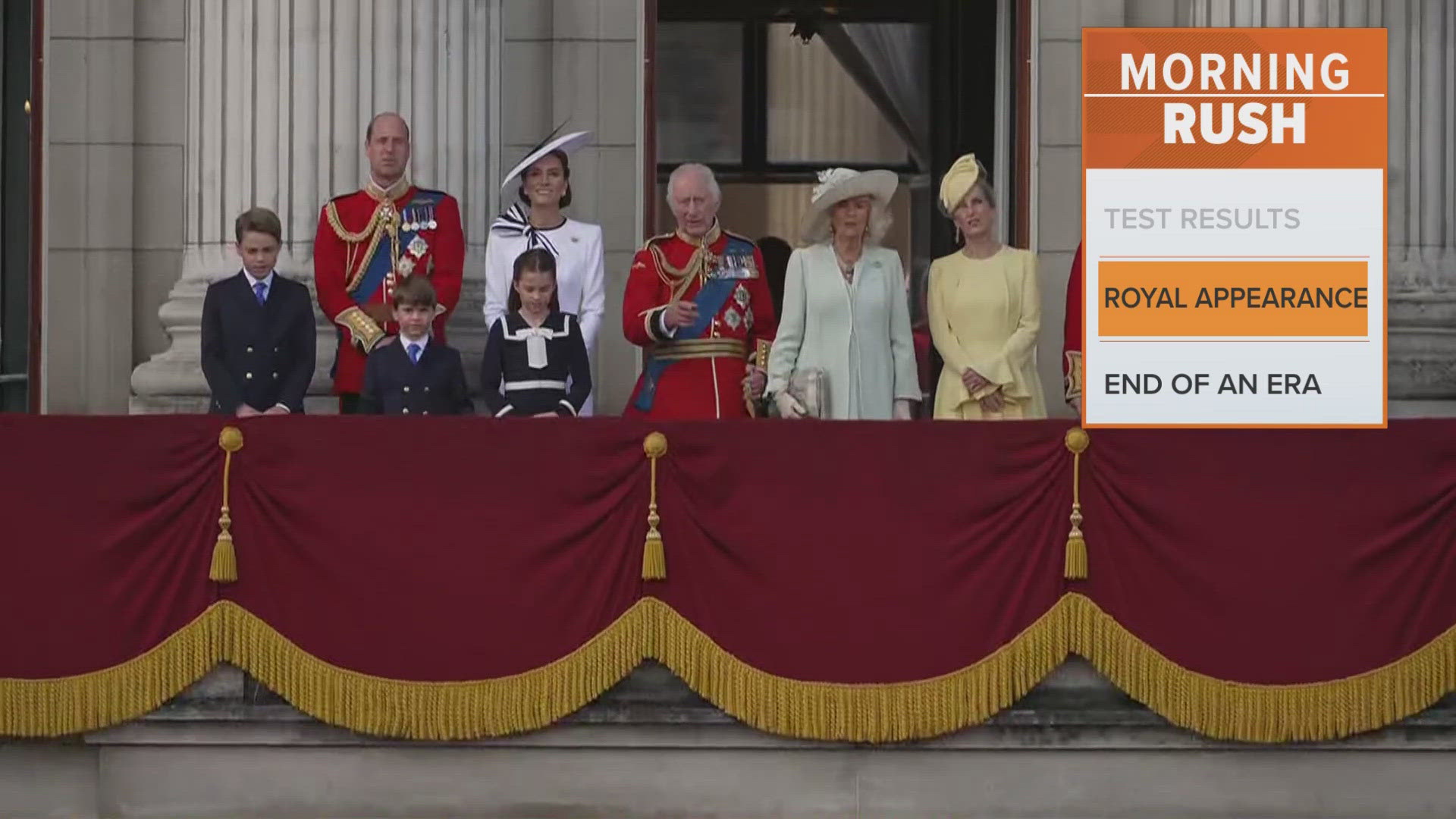LONDON, UK — Britain put on a display of birthday pageantry Saturday for King Charles III, a military parade that marked the Princess of Wales’ first public appearance since her cancer diagnosis early this year.
The annual event was also a show of stability by the monarchy after months in which both the king and Kate, wife of heir to the throne Prince William, have been sidelined by cancer treatment.
In a symbolic display of unity, Charles, Queen Camilla, William, Kate and their children were joined by other members of the royal family on a Buckingham Palace balcony at the end of the King’s Birthday Parade. The family waved to the gathered crowd as they watched a flyby of military aircraft to cap ceremonies marking the monarch’s official birthday.
It was the first time Kate has appeared in public since December. She disclosed in March that she was undergoing chemotherapy for an unspecified form of cancer.
“I am making good progress, but as anyone going through chemotherapy will know, there are good days and bad days,” Kate said in a statement released Friday, adding that she faces “a few more months” of treatment.
Kate said she is “not out of the woods yet” and officials stress that Saturday’s engagement does not herald a full return to public life.
Huge crowds turn out each June to watch the birthday parade, also known as Trooping the Color, which begins with a procession involving horses, musicians and hundreds of soldiers in ceremonial uniform from Buckingham Palace.
The first public sight of the 42-year-old princess came when she traveled in horse-drawn carriage from the palace down the grand avenue known as the Mall with her children George, 10, Charlotte, 9, and 6-year-old Louis. Bystanders cheered as they caught a glimpse of Kate, dressed in a white dress by designer Jenny Packham and wide-brimmed Philip Treacy hat.
She watched the ceremony with the children from the window of a building overlooking Horse Guards Parade, a ceremonial parade ground in central London. Louis yawned broadly at one point in proceedings but mostly watched intently.
Prince William, in military dress uniform, rode on horseback for the ceremony, in which troops parade past the king with their regimental flag, or “color.” The display of precision marching and martial music stems from the days when a regiment’s flag was an essential rallying point in the fog of battle.
Charles, who also is being treated for an undisclosed form of cancer, traveled in a carriage with Queen Camilla, rather than on horseback as he did last year. The king inspected the troops from a dais on the parade ground, saluting as elite regiments of Foot Guards marched past.
Five regiments take it in turns to parade their color, and this year it was the turn of a company of the Irish Guards, which has Kate as its honorary colonel. The troops in scarlet tunics and bearskin hats were led onto the parade ground by their mascot, an Irish wolfhound named Seamus.
Charles, 75, disclosed his cancer in February, and has recently eased back into public duties. He attended commemorations last week for the 80th anniversary of D-Day, the Allied invasion of Nazi-occupied Europe on June 6, 1944.
In one of the many quirks of British royal convention, Saturday is not the king’s real birthday — that’s in November. Like his mother Queen Elizabeth II before him, Charles has an official birthday on the second Saturday in June. The date was chosen because the weather is generally good, though early sunshine on Saturday gave way to a blustery, rainy day in London.
The rain held off for most of the ceremony but began pelting down as the massed troops escorted the royal carriages back to Buckingham Palace past soggy but enthusiastic crowds.
Blue sky returned as the family emerged onto the balcony to watch a flyby that included the Royal Air Force aerobatic team, the Red Arrows, trailing red, white and blue plumes of vapor.
Thousands of royal fans in raincoats and umbrellas cheered, as a smattering of anti-monarchist protesters chanted “Not my king.”
Spectators who braved the volatile weather were treated to a display of pomp and precision involving 1,400 soldiers, 250 military musicians and more than 200 horses. The equine participants included Trojan, Tennyson, and Vanquish, three of the five military horses who sparked mayhem in April when they bolted and ran loose through central London.
The horses were performing routine exercises near Buckingham Palace on April 24 when they became spooked by noise from a nearby building site and galloped loose through the capital’s streets, crashing into vehicles and causing chaos during the morning rush hour.
The army says the other two horses are recovering well and are also expected to return to duty.

